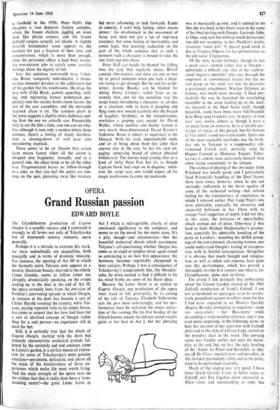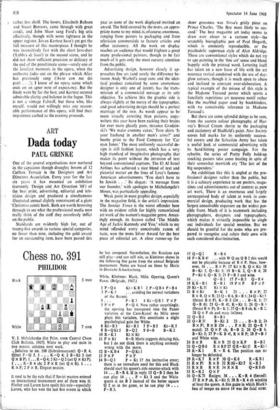Grand Russian passion
OPERA EDWARD BOYLE
The Glyndeboume production of Eugene Onegin is a notable success, and I commend it strongly to all lovers not,only of Tchaikovsky but of nineteenth' century romantic opera generally.
Perhaps it is a mistake to overrate this work, for there undoubtedly are inequalities, both musically and in terms of dramatic intensity. For instance, the opening of Act HI in which the formerly naive Tatyana now appears as a mature, illustrious beauty, married to the elderly Count Gremin, seems to follow rather too abruptly, dramatically speaking, on the events leading up to the duel at the end of Act II; the opera certainly loses from the omission of Pushkin's intervening episode in which Onegin, in remorse at the duel, has become a sort of Childe Harold roaming the country, while Tat- yana, paying repeated visits to his empty house, has come to suspect that her love had been for a sort of idealised concept of Onegin rather than for a real person—an experience still in store for her.
Still, it is certainly true that the whole of Eugene Onegin, starting with the short but intensely characteristic orchestral prelude fol- lowed by the curiously sad and ominous scene in Larina's garden, is a perfect means of expres- sion for some of Tchaikovsky's most genuine emotions—pessimism, defeatism, and above all the sense of the transitoriness of those ex- periences which make life most worth living. And the main strength of the opera rests on the evident fact that it really does have a 'com- manding centre'—the great Letter Scene in
Act I which is unforgettable, clearly of deep emotional significance to the composer, and seems to set the mood for the entire score. It's a pity, though—and characteristic—that the beautiful orchestral chords which accompany Tatyana's self-questioning whether Onegin has come as an angel or tempter never again sound so convincing as on their first appearance; the harmony becomes regrettably cheapened in later variants. Perhaps it was a consequence of Tchaikovsky's temperament that, like Mendels- sohn, he often seemed to find it difficult to fix his mind firmly on some of his finest ideas.
Because the Letter Scene is so central to Eugene Onegin, any production of the opera must stand or fall, principally, by its casting of the role of Tatyana. Elisabeth Siiderstrom acts the part most convincingly, and her per- formance must be reckoned the major attrac- tion of the evening. On the first Sunday of the Glyndebourne season she did not sound vocally quite at her best in Act I, but her phrasing
was as musicianly as ever, and it seemed to me that she was back in her finest voice in the scene of her final parting with Onegin. Gertrude Jahn, as Olga, sang well but without much distinction; one did not recognise, in her, Pushkin's pretty, vivacious `sweet girl.' A special good mark is due to Virginia Popova for her performance as the old nurse, Filippyevna.
Of the men, Assem Selimsky, though he has a good voice, seemed rather lost as Onegin- admittedly a difficult role, that of the sophisti- cated `negative identifier' who sees through the emptiness of conventional society but has no real grasp on life until, too late, he discovers a passionate attachment. Wieslaw Ochman, as Lensky, was much more moving—I liked par- ticularly the way he launched the concluding ensemble in the scene leading up to the duel; his farewell in the Duel Scene itself, though beautiful, could have been more full-blooded.
Kim Borg sang Gremin's aria 'in praise of true love' very slowly, almost as though it were a set piece from an oratorio; he is a reliable per- former of music of this period, but his bottom G Flat didn't sound too comfortable. Quite one of the most enjoyable interludes was the birth- day ode to Tatyana in a (supposedly) old- fashioned French style, perfectly sung by Hugues Cuenod as Monsieur Triguet; Tchai- kovsky is seldom more deliciously himself than when trying consciously to be antique.
The orchestral playing of the LPO under John Pritchard was mostly good, and I particularly
liked Pritchard's handling of the Duel Scene;
there were times, however, when he did not surrender sufficiently to the hectic quality of
some of the orchestral writing—that intense feeling for the transitoriness of experience, to which I referred earlier. Pier Luigi Pizzi's sets were admirable, especially the attractive and
successful ballroom in Act Three with its trompe ''nail suggestion of depth. I did not like,
in this scene, the intrusion of opera-ballet, which seemed out of place. Otherwise it was hard to fault Michael Hadjimischev's produc- tion, especially his admirable handling of the party at Lavinia's—watching his skilful group- ings of the conventional, chattering women, one could understand Onegin's feeling of exaspera- tion, with its baleful consequences. Altogether it is obvious that much thought and imagina- tion, as well as talent and expense, have gone into this performance, which has proved a thoroughly worthy first venture into what is, for Glyndebourne, quite new territory.
I'm afraid I felt distinctly less enthusiastic about the Cogent Garden revival of the 1961 Zelfirelli production of Verdi's Falstaff. I am not so hardened an opera-goer as to be instinc-
tively prejudiced against novelties. none the less I had never expected to see Mistress Quickly (Regina Resnik) attempting to negotiate—none too successfully — her 'Reverenza' while descending a steep wooden staircase; and it was even more surprising, in the following scene, to hear her account of her interview with Falstaff delivered in the style of a Great Lady, seated on the grandest chair in the room. The opening scene was frankly awful—not only the horse-
play at the end, but, no less, the ugly bawling of the `Amen' by Pistol and Bardolph, as they see off Dr Caius; musical puns and parodies, in this instance particularly subtle and to the point, need to be performed musically.
Much of the singing was very good. I have never heard Geraint Evans in better voice as Falstaff, nor Ilya Ligabue more successful as Alice—clear and commanding as ever, but rather less shrill. The lovers, Elizabeth Robson and Stuart Burrows, came through with groat credit, and John Shaw sang Ford's big aria effectively, though with some tightness in the upper register. Istvan Kertesz hasn't yet got the full measure of this masterpiece. I thought he was insensitively fast with the short love-duet ('Labbra di foco') in the second scene, and he did not show sufficient precision or delicacy at the end of the penultimate scene—surely one of the loveliest moments in the opera, when the orchestra fades out on the phrase which Alice has previously sung ('Avro con me dei patti . . .'); I know of no opera scene which ends on an apter note of expectancy. But the finale went by far the best, and Kertesz secured admirable clarity and balance in the fugue. This is not a vintage Falstaff, but those who, like myself, would not willingly miss any reason-, able performance of this opera, will find their impatience curbed as the evening proceeds.











































 Previous page
Previous page